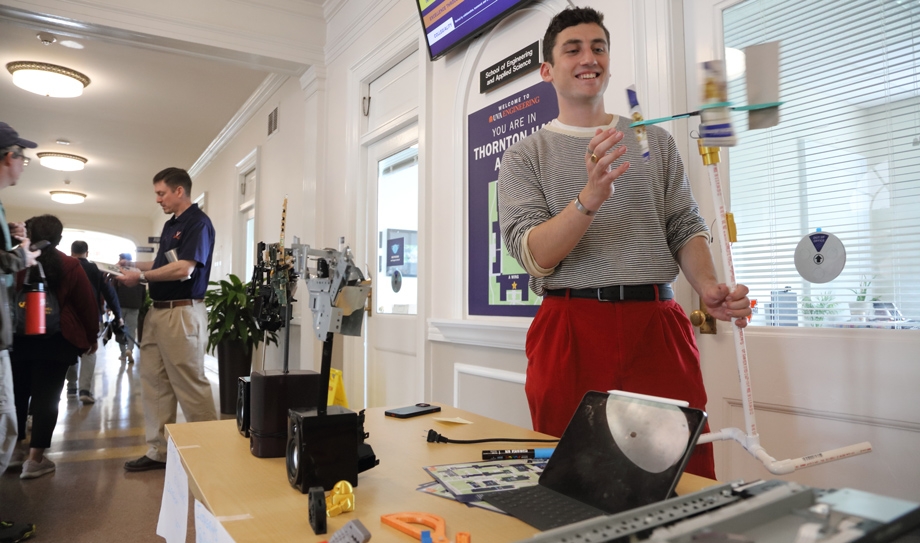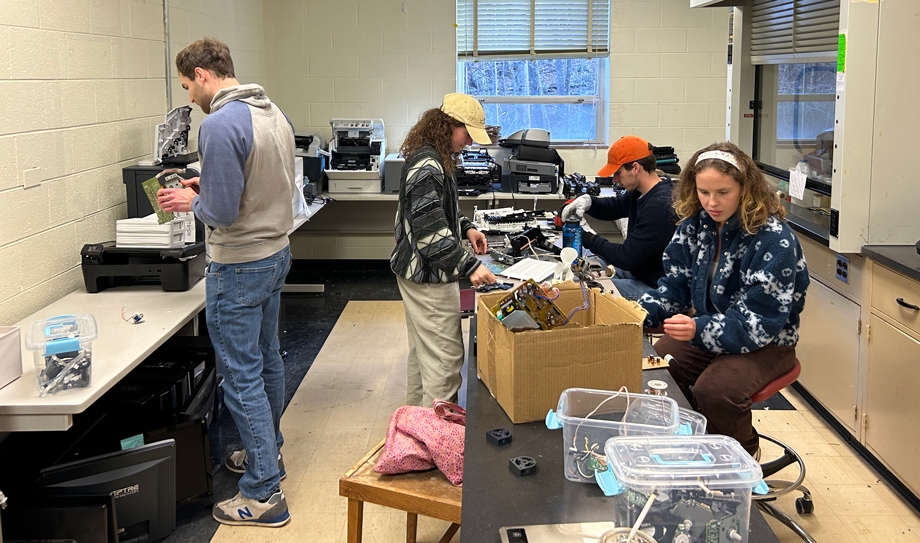If there's someone who is up to the challenge of revolutionizing recycling at the University of Virginia and beyond, Zack Landsman is that person. A Ph.D. student in systems engineering at the University of Virginia School of Engineering and Applied Science, Landsman is intensely curious and driven to make things better.
Those qualities, along with educational opportunities and professional experiences gained at UVA, have propelled him to pursue a groundbreaking initiative, Printers 4 Kidz. This program creates free STEM kits for local schools by recycling and reusing electronic equipment, such as printers, and plastics from UVA Health — but that's only the beginning.
A fortuitous path brought Landsman to this point. As an undergraduate, the double Hoo double majored in biomedical engineering and cognitive science with a minor in technological entrepreneurship.
He's also a gay man in STEM, field — science, technology, engineering and math — notably lacking in queer visibility. His life experiences have equipped him with a laser-focus on breaking down barriers and solving problems. At first, that meant setting his sights on a career designing medical devices to help improve people's lives.

Originally from Bel Air, Maryland, he grew up in a family of medical professionals. He’s also had plenty of his own experiences as a patient to draw from, including heart surgery, surgery to treat a collapsed lung and more.
“I thought I understood what it meant to improve the state of care,” Landsman said. “I know how great it is when someone tells you what’s wrong with you because you know you can address it — you can make it better. That was my goal going forward.”
While studying at UVA, he’s had the opportunity to dip his toe into different fields, and his interests have evolved and widened. He had a stint in marketing, an internship at Apple, and he worked as a research assistant in a lab. He found unique pleasure in working for a local startup that designs medical devices.
As Landsman was starting his Ph.D., he became interested in environmental safety, environmental health and environmental policy, and was drawn to the sense of community he found in those spaces.
“In the recycling industry, these groups put everything they’ve ever done online,” he said. “They want to advance the state of the field and improve our living, our circularity and address equity. That’s a huge inspiration for me.”
Precious Plastic, a global community of people focused on reducing plastic waste, has been a particularly influential resource, he said.
Printers 4 Kidz joins all those interests — the medical field and devices, entrepreneurship and collaboration, sustainability and recycling, and STEM education and the inequities therein.
Solving Problems with STEM Kits
It was a volunteer opportunity at Computers4Kids, or C4K, a local mentorship program for youth focused on science, technology, engineering, arts and math, that first got Landsman thinking about STEM kits.
“They worked with these amazing STEM kits to teach kids about engineering and get them excited,” Landsman said.
But he also saw room for improvement.
“I wanted to make STEM kits that were going to be reused, that could be easily disassembled, and also recycled if they’re broken,” he said.
Researching STEM kits led Landsman to uncover barriers to implementation. Many pose challenges for teachers because they have too many pieces, are too complicated, take too much time to complete and are cost prohibitive. The Printers 4 Kidz plan solves these problems, beginning with offering the kits at no cost to teachers.
Teachers spent about $500 per year buying materials for their classrooms prior to the pandemic, and it’s estimated that number has only increased, according to the National Education Association.
“That’s a very harsh burden to carry, so we want to address that,” Landsman said.
The STEM kits allow students to assemble functional wind turbines. Once assembly is complete, students can test the ability of the wind turbines to generate electricity using Arduino, a microcontroller frequently used in programming education. Designed with few parts, Landsman hopes the kits are easy to use in the classroom.
In future iterations, he plans to modify kits for varying levels of complexity, so they could be incorporated into lessons in both middle schools and high schools.
New Life for Recycled Materials
Recycled materials make up all the parts needed for the STEM kits. A wind turbine works by spinning an unpowered motor, so Landsman extracts motors and other electronics primarily from e-waste printers, but also desktop computers and monitors, all of which are supplied by the UVA Reuse Store. The idea of using recycled electronic parts arrived while working in professor of systems engineering Gregory J. Gerling’s Touch Lab at UVA.
Landsman was building amplifier circuits to improve component parts used in his research, but supply chain issues made it difficult to procure circuits. He got creative, salvaging parts from discarded printers and other e-waste.
“As I was taking apart old printers, I started seeing all this other cool stuff in them,” Landsman said. “If you were to buy the materials inside the printer, they would cost around the same price as the printer. And we’re throwing all this away without even caring about the value we’re giving up as a community.”
Landsman envisions Printers 4 Kidz as part of a circular economy, in which he reinvests these recycled parts into the community, and the items are continuously reused or repurposed rather than discarded as waste.

In addition to the recycled motors, the STEM kits call for wind turbine blades and holders. Landsman researched how to 3D print these materials from recycled plastic. A shredder refines the plastic into small pieces, and an extruder forms those pieces into 3D printing filament, which in turn can be used to 3D print the kits’ blades and holders. If pieces break or there’s no longer a use for them, they can undergo the same process again.
Printers 4 Kidz received a $30,000 grant in the 2022-2023 academic year from the Jefferson Trust, which provides funding to students, faculty and staff members with innovative ideas for improving the University community. Among other things, the grant has allowed Landsman to acquire a plastic shredder and extruder to make this process possible.
As for where to find the plastic, the obvious choice was UVA Health.
“The hospital is one of UVA’s greatest contributors to waste, given the sterile environment demanded in the medical field,” Landsman said.
The UVA Facilities Management recycling team has initiated a pilot in collaboration with UVA Health to provide Landsman with pre-sorted recycled materials such as packaging for medical equipment, plastic distilled water bottles and saline containers.
If all goes according to plan, the Printers 4 Kidz STEM kits will present an effective way to recycle a substantial portion of the hospital’s plastic waste, contributing to UVA’s overall goal of reducing its waste footprint to 30% of 2010 levels by 2030, a 70% reduction.
Hopes for the Future
There are goals that Landsman sees as easily achievable, such as making STEM kits from recycled electronics and hospital waste and providing them to local schools at no cost.
But then there are loftier goals he hopes to attain, such as “becoming Charlottesville’s recycling mill.” Landsman wants to streamline the recycling process to prioritize retaining the value that can be gained from recycled plastic and return it to the community.
Currently, UVA’s recycling process involves items being hand-sorted and baled by the University and then processed into new materials at facilities in North Carolina.
“Our hope is that we can become a UVA recycling center and then a Charlottesville recycling center, and then a decentralized recycling option instead of using recycling mills that process a large amount of plastic on the East Coast,” Landsman said. “When you transfer the plastic outside of the community to these recycling mills, the community doesn’t see any return on value. And there’s a lot of transportation costs and energy emissions.”
The plans don’t stop there. Landsman is striving to create a nonprofit, self-sustaining model for this program that generates revenue, so it can continue long after he completes his education at the University. He also plans to incorporate an education fund to support local teachers.
In addition, he has built a curriculum around sustainable design skills to then help students use those skills to in turn help the community. He designed and taught a class last fall that will be offered again in fall 2023. In ENGR 1501: Disassembly and Discovery, students identify an example of electronic waste, learn how the design contributed to it becoming waste, disassemble it to determine what can be salvaged, and then create a plan for how to use the salvaged parts.
“With these students who are learning sustainable design skills, I want to reach out to local businesses and groups to provide consulting and design solutions to help with their electronic and plastic waste channels,” he said.
For Zack Landsman, the potential of recycling is literally limitless. If anyone can revolutionize it, he can.